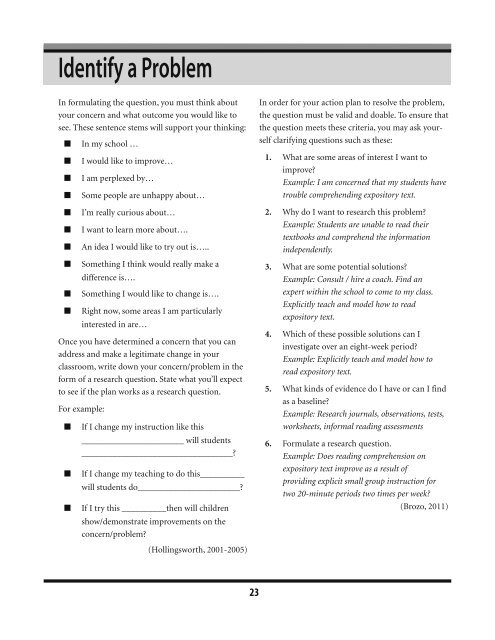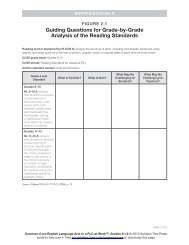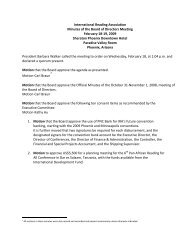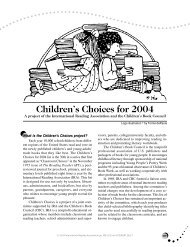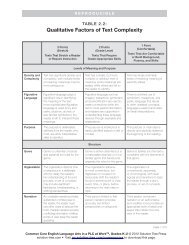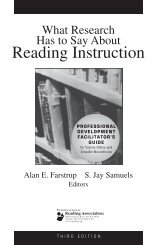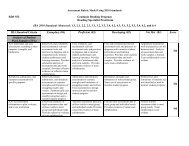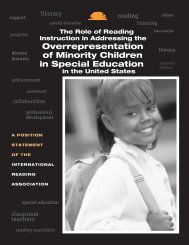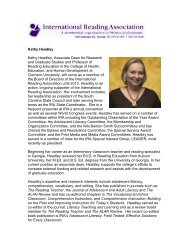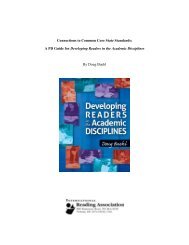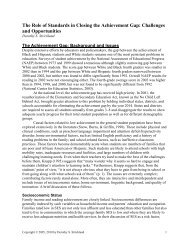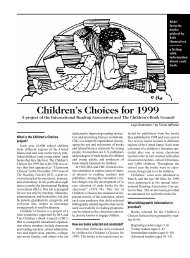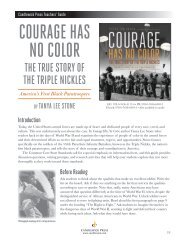A Practical Guide to Action Research for Literacy Educators
A Practical Guide to Action Research for Literacy Educators
A Practical Guide to Action Research for Literacy Educators
You also want an ePaper? Increase the reach of your titles
YUMPU automatically turns print PDFs into web optimized ePapers that Google loves.
Identify a Problem<br />
In <strong>for</strong>mulating the question, you must think about<br />
your concern and what outcome you would like <strong>to</strong><br />
see. These sentence stems will support your thinking:<br />
■<br />
■<br />
■<br />
■<br />
■<br />
■<br />
■<br />
■<br />
■<br />
■<br />
In my school …<br />
I would like <strong>to</strong> improve…<br />
I am perplexed by…<br />
Some people are unhappy about…<br />
I’m really curious about…<br />
I want <strong>to</strong> learn more about….<br />
An idea I would like <strong>to</strong> try out is…..<br />
Something I think would really make a<br />
difference is….<br />
Something I would like <strong>to</strong> change is….<br />
Right now, some areas I am particularly<br />
interested in are…<br />
Once you have determined a concern that you can<br />
address and make a legitimate change in your<br />
classroom, write down your concern/problem in the<br />
<strong>for</strong>m of a research question. State what you’ll expect<br />
<strong>to</strong> see if the plan works as a research question.<br />
For example:<br />
■<br />
■<br />
■<br />
If I change my instruction like this<br />
_______________________ will students<br />
__________________________________?<br />
If I change my teaching <strong>to</strong> do this__________<br />
will students do_______________________?<br />
If I try this __________then will children<br />
show/demonstrate improvements on the<br />
concern/problem?<br />
(Hollingsworth, 2001-2005)<br />
In order <strong>for</strong> your action plan <strong>to</strong> resolve the problem,<br />
the question must be valid and doable. To ensure that<br />
the question meets these criteria, you may ask yourself<br />
clarifying questions such as these:<br />
1. What are some areas of interest I want <strong>to</strong><br />
improve?<br />
Example: I am concerned that my students have<br />
trouble comprehending exposi<strong>to</strong>ry text.<br />
2. Why do I want <strong>to</strong> research this problem?<br />
Example: Students are unable <strong>to</strong> read their<br />
textbooks and comprehend the in<strong>for</strong>mation<br />
independently.<br />
3. What are some potential solutions?<br />
Example: Consult / hire a coach. Find an<br />
expert within the school <strong>to</strong> come <strong>to</strong> my class.<br />
Explicitly teach and model how <strong>to</strong> read<br />
exposi<strong>to</strong>ry text.<br />
4. Which of these possible solutions can I<br />
investigate over an eight-week period?<br />
Example: Explicitly teach and model how <strong>to</strong><br />
read exposi<strong>to</strong>ry text.<br />
5. What kinds of evidence do I have or can I find<br />
as a baseline?<br />
Example: <strong>Research</strong> journals, observations, tests,<br />
worksheets, in<strong>for</strong>mal reading assessments<br />
6. Formulate a research question.<br />
Example: Does reading comprehension on<br />
exposi<strong>to</strong>ry text improve as a result of<br />
providing explicit small group instruction <strong>for</strong><br />
two 20-minute periods two times per week?<br />
(Brozo, 2011)<br />
23


